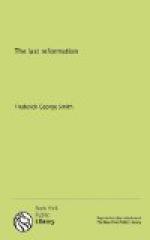Paul gives a more particular description of the coming apostasy in the second chapter of Second Thessalonians. Asserting that the second coming of Christ was not at that time imminent, he says: “Let no man deceive you by any means: for that day shall not come, except there come a falling away first, and that man of sin be revealed, the son of perdition; who opposeth and exalteth himself above all that is called God, or that is worshiped; so that he as God sitteth in the temple of God, showing himself that he is God” (verses 3, 4).
The development of the “man of sin,” which was occasioned by the “falling away,” was to be gradual, but should finally assume great proportions, “so that he as God sitteth in the temple of God showing himself that he is God.” The apostle further states: “For the mystery of iniquity doth already work: only he who now letteth will let, until he be taken out of the way. And then shall that wicked be revealed, whom the Lord shall consume with the spirit of his mouth, and shall destroy with the brightness of his coming” (verses 7, 8). We should not seek for the fulfilment of this prediction in those minor sects and heresies which at an early date arose and soon passed away: the description refers to some great power occupying the greatest prominence, making the most pretentious claims, a power that is to endure until the second advent of Christ. We must, therefore, look for its fulfilment in what we may term the main line of historic Christianity.
[Sidenote: First evidences of decline]
The “falling away” from the simple truths and standards of the gospel began at a very early date. The mystery of iniquity was already working in the apostles’ day. Before the close of the first century we find in the churches of Asia Minor a sad deflection from their primitive condition. The church at Ephesus had left its first love (Rev. 2:4); the church at Pergamos was tolerating false teachers and being ruined by false doctrines (2:14, 15); Thyatira had lost the spirit of holy judgment against wrong-doing and was therefore affected by a shocking degree of immorality (2: 20-23); the message to Sardis was, “Thou hast a name that thou livest, and art dead (3:1); Laodicea had become so lukewarm that the Lord said, “I will spew thee out of my mouth” (3:15, 16).
[Sidenote: The apostolic fathers]
The transition from the apostles to the age of the early church fathers is involved in considerable darkness. Not until the middle of the second century, when Justin Martyr appears on the scene, does the church emerge from its obscurity into the clear light of history. The apostolic fathers—Clement of Rome, Ignatius, the Pastor of Hermas, Papias, and the unknown author of the Epistle to Diognetus—all these lived and wrote during that transitional period, and they could have told us much, but they have told us little. We can not but admire the beautiful spirit in which they wrote, and their style is earnest and vital. Nevertheless, we discern in these works two leading tendencies which stand, so to speak, as prophecies of what was to predominate in the ecclesiastical thought of succeeding centuries.




